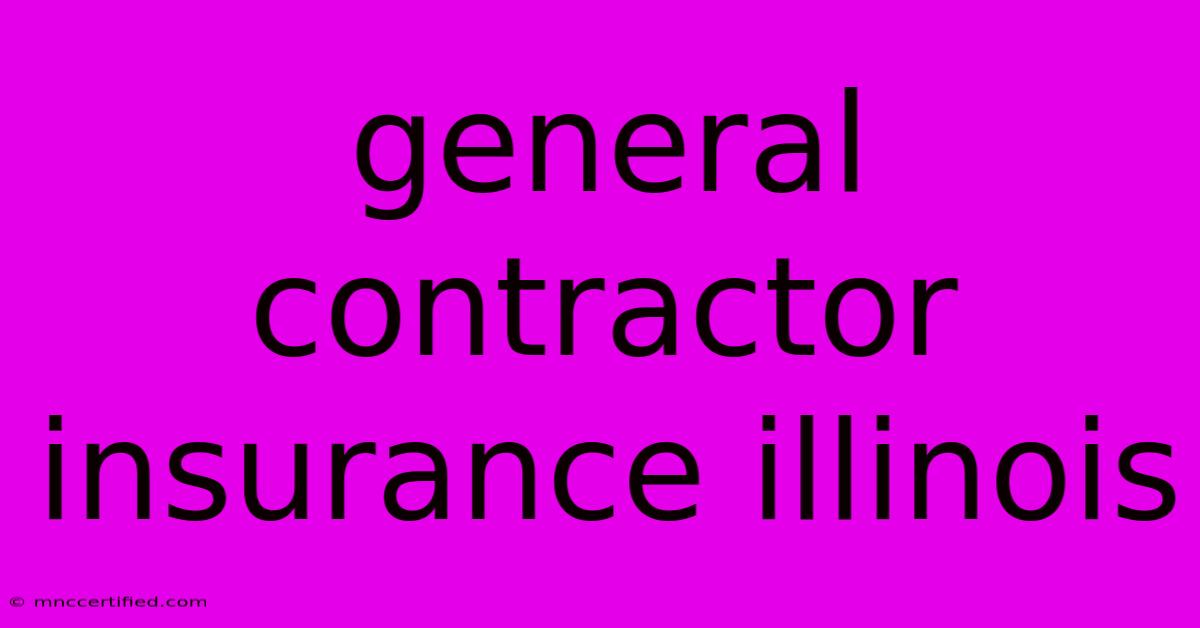General Contractor Insurance Illinois

Table of Contents
General Contractor Insurance in Illinois: A Comprehensive Guide
As a general contractor in Illinois, protecting your business and your clients is paramount. General contractor insurance is essential to mitigate financial risks associated with accidents, injuries, property damage, and legal claims. This comprehensive guide will explore the different types of insurance crucial for Illinois general contractors, outlining coverage details and their importance.
Essential Insurance Policies for General Contractors in Illinois
1. General Liability Insurance: This is the cornerstone of contractor insurance. It covers third-party bodily injury and property damage, including:
- Bodily Injury: Protects you if someone is injured on your worksite, regardless of fault.
- Property Damage: Covers damage to someone else's property caused by you or your employees.
- Advertising Injury: Safeguards you against claims related to libel, slander, or copyright infringement.
2. Workers' Compensation Insurance: This mandatory coverage in Illinois protects your employees in case of work-related injuries or illnesses. It covers medical expenses, lost wages, and death benefits.
3. Commercial Property Insurance: This policy protects your business property, including tools, equipment, and materials, against fire, theft, vandalism, and other covered perils.
4. Professional Liability Insurance (Errors and Omissions): This coverage protects you against claims arising from professional negligence or errors in your work. This is crucial for complex projects or specialized services.
5. Auto Liability Insurance: If you use company vehicles, you need auto liability insurance to cover damages or injuries caused by your vehicles.
6. Umbrella Liability Insurance: This additional coverage provides extra protection on top of your existing policies, offering a higher limit for liability claims.
Key Considerations for Illinois General Contractors
- Illinois Specific Laws: Be aware of state-specific regulations regarding insurance requirements for general contractors.
- Project Scope and Complexity: The specific insurance policies you need will depend on the types of projects you undertake.
- Contracted Work: Carefully review contracts with clients to understand their insurance requirements and your responsibilities.
- Policy Limits and Deductibles: Choose coverage limits and deductibles that align with your business needs and financial capabilities.
The Benefits of Having Adequate Insurance
- Financial Protection: Insurance safeguards your business from significant financial losses due to lawsuits, claims, or accidents.
- Reputation Management: A solid insurance portfolio demonstrates professionalism and reliability, enhancing client trust and confidence.
- Contractual Requirements: Many clients demand proof of adequate insurance before awarding contracts.
- Peace of Mind: Having the right insurance coverage provides peace of mind, allowing you to focus on running your business effectively.
How to Find the Right Insurance Coverage
- Consult with an Experienced Broker: A specialized insurance broker can assess your needs and recommend tailored solutions.
- Compare Quotes: Get quotes from multiple insurance providers to compare rates and coverage options.
- Read Policy Documents: Carefully review policy documents to understand your coverage and exclusions.
Conclusion
General contractor insurance is a crucial investment for your business success in Illinois. By understanding the different types of coverage, their importance, and key considerations, you can protect your business, your employees, and your clients from unexpected risks. Remember to consult with an insurance expert to ensure you have the right coverage for your unique business needs.

Thank you for visiting our website wich cover about General Contractor Insurance Illinois. We hope the information provided has been useful to you. Feel free to contact us if you have any questions or need further assistance. See you next time and dont miss to bookmark.
Featured Posts
-
Olympics The Benefits Beyond Sports
Nov 10, 2024
-
Aicpa Investment Company Expert Panel
Nov 10, 2024
-
Is Tooth Bonding Covered By Insurance
Nov 10, 2024
-
How Long Does Bonding Last On A Tooth
Nov 10, 2024
-
Watch Crystal Palace Vs Fulham Live Free
Nov 10, 2024